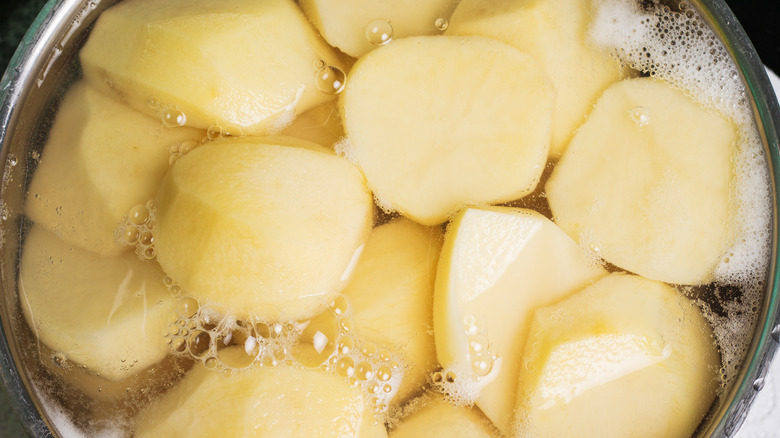To Prevent Overcooked Potatoes, Add A Splash Of Vinegar
Everyone's done it before — overcooked potatoes, that is. Whether it's because a timer didn't get set and the potatoes were forgotten on the stove for a few minutes too long or any number of distractions got in the way, anyone who has boiled their share of potatoes has overcooked a batch at least once or twice. And whether those spuds were meant to be roasted, turned into home fries, or used for potato salad, once they turn mushy there really is no way to save them, except to change gears and make mashed potatoes instead.
In that sense, an ounce of prevention can make up for the lack of a suitable cure. This is why you should be adding a splash of vinegar to the water each and every time you boil potatoes. A little will go a long way, so just a tablespoon will do for every four cups of water. Keep the ratio going and double the vinegar for eight cups, and so on. More won't hurt your potatoes per se — and the acidic flavor may even be a bonus if your goal is to make potato salad — but boiling vinegar does result in a rather strong smell so it's probably best not to overdo it if you can help it.
Why vinegar prevents potatoes from getting overcooked
Potatoes are packed with starch — so much so that they often get a bad rap for containing too much of the stuff. But that starch is also what gives them their signature texture, making the root vegetable a comfort food for many people. Starch relies on pectin to keep its shape and composure, and that's where things can get dicey. "As the potato cooks, the pectin slowly breaks down, and the starch granules start absorbing water," J. Kenji López-Alt explained in Serious Eats. If your spuds are on the stove too long, "the potato cells start falling away, and the whole thing turns mushy."
So what's that got to do with vinegar? Well, this tangy addition ups the acid factor of the water, which in turn helps keep that pectin from losing its grip on the starch. As far as insurance policies go this one is definitely worth buying into. Not only will it buy you some much-needed time in the event that your attention to the stove is interrupted, but it's a rather cheap preventative fix to begin with. And with such a small amount needed, it won't change the flavor of your potatoes, so there really aren't any good reasons not to take advantage.
A splash of vinegar is also good for hard-boiled eggs
Don't put the vinegar away just yet! When making potato salad, those starchy tubers aren't the only ingredient that will benefit from adding a little bit of vinegar to the water they are cooked in. Hard-boiled eggs will also be greatly improved. Not only does the acidic environment help the egg white cook faster, but it actually weakens the shell and makes it easier to remove. So if you've tried adding salt and baking soda to no avail, it's time to give vinegar a try instead.
As with potatoes, you'll only need a tablespoon of vinegar for each quart of water. Apple cider and white vinegar both work with eggs and potatoes alike so it doesn't matter which one you choose. Either way, you'll get eggs that practically slide out of their shells. And of course, you'll be able to keep your potatoes safe from overcooking even if you leave them on the burner a couple of minutes too long. The result will be not just the perfect ingredients for potato salad — your deviled eggs, home fries, and roasted potatoes will all be improved by adding a little bit of vinegar to the water.


